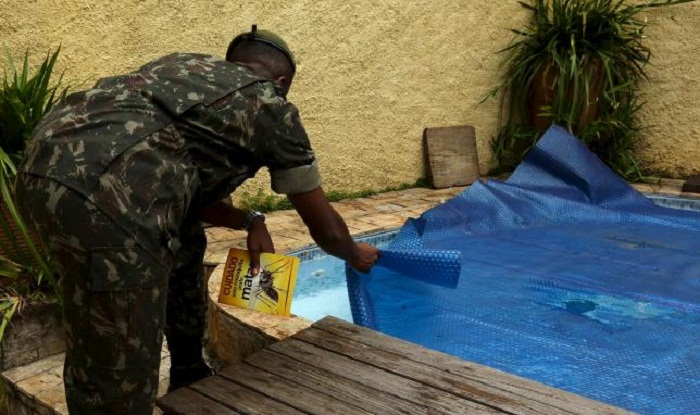Earlier in the week, in Brazil, the country most affected in the Americas, president Dilma Rousseff tweeted “We must wage war against Aedes aegypti, the vector of dengue, of chikungunya and of Zika.”
From the sensible to the ambitious, here are seven tactics countries could consider:
1. Don’t get bitten
“Easier said than done,” says Cameron Webb, a mosquito researcher at the University of Sydney. People need to cover up and spray all exposed skin with repellent such as DEET. But many people can’t afford repellents and those who can tend not to apply them properly, Webb says. “If there’s a chink in your armour, they’ll find it.”
2. Eliminate mosquitoes
Aedes aegypti mosquitoes live in urban areas, laying eggs in water pooled in places such as plant pot saucers and blocked gutters. The species also transmits yellow fever, and in the 1960s several South American countries – including Brazil – eliminated it by spraying with DDT and urging households to get rid of breeding sites. Unfortunately the mosquitoes survived in a few locations, and after the development of a yellow fever vaccine, campaigns dwindled and the mosquito returned.
The strategy would be harder to implement today as DDT is widely banned and there is resistance to other insecticides, but it is not impossible.
3. Modify mosquitoes
As the mosquitoes that carry Zika also transmit the potentially deadly dengue fever, there are already high-tech eradication methods in the works. The most advanced involves making genetically modified mosquitoes whose offspring die as larvae. This requires regular releases of GM males to reduce the population. (Only females bite people.)
In a recent trial in Brazil, the number of native mosquitoes shrunk by 95 per cent within six months. There is wide opposition to GM animals in some countries but Zika could change things. “This could be the killer app for GMOs,” says Anthony Wilson of the Pirbright Institute in Woking, UK.
4. Enlist bacteria
This approach would not wipe out mosquitoes but could make them less able to pass on Zika. The mosquito’s ability to transmit the dengue virus is cut if the insect is also infected with a bacterium called Wolbachia.
It’s likely that Wolbachia also blocks Zika, says Webb. These bacteria are naturally present in nearly two-thirds of all insects, including some mosquitoes, though not A. aegypti. Trials with the species have shown infection spreads fast among local insects. “The modified mosquitoes find all those other insects hidden away that humans have a hard time finding – they do the work for you,” says Webb.
5. Gene drive
If we could work out a way to genetically alter mosquitoes so they are resistant to carrying Zika, we could spread that resistance. In a method known as a gene drive, the insects are given DNA that is passed on to all of their offspring, not just half, as with conventional reproduction. The technique has already been used to spread resistance to the malaria parasite in a different mosquito species, although there is concern about taking such an irreversible step.
6. Make a vaccine
We have a head start here, as Zika is closely related to two viruses for which vaccines are already in development, says Anthony Fauci of the US National Institutes of Health. A DNA-based vaccine for West Nile virus could be altered to include Zika genes. A live dengue vaccine has already reached large-scale trials, so a similar approach will be tried for Zika.
7. Don’t get pregnant
Some countries are advising women to postpone pregnancy. That is more practical for some than others due to the varying influence of the Catholic Church’s ban on artificial contraception. In Brazil the edict is widely flouted, but elsewhere contraception is less available or affordable. In most of South and Central America abortion is legal only in very limited circumstances.
More about:
















































